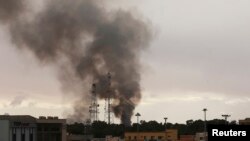Police stations, prisons and the local security headquarters have reopened in Benghazi for the first time in over a year, officials said, after pro-government forces seized back part of the port city.
Medics said about 450 people have been killed in a two-month offensive by pro-government forces that has restored some sense of normalcy in parts of the city, though fighting is still raging in the port and other areas.
The return of order to some parts of Benghazi will provide encouragement to the internationally recognized government, which lost control of the capital, Tripoli, to a group from the west of the country in August.
The government, which fled to Bayda, east of Benghazi, sees the return of policing as a sign of progress toward ending the anarchy in the oil-producing North African country.
Ex-general's help
Critics say its military gains were achieved only with the help of a former army general, Khalifa Haftar, using aircraft and artillery in densely populated areas. Army special forces, backed up by Haftar's troops, have expelled Islamist groups that had roamed unchallenged through parts of Benghazi.
About five police stations, two prisons, the city's passport immigration office and local intelligence headquarters have reopened, security officials told a Reuters team during an organized tour.
"We've resumed work at all police stations in Benghazi except where fighting is ongoing," said Tareq Kharaz, spokesman for Benghazi's security forces. A detective unit had also restarted work.
Army special forces will accompany police patrols, which had stopped because of ambushes, a spokesman for the force said.
Police stations had been closed for over a year because of frequent attacks with rocket-propelled grenades and other weapons. Police and army officers used to keep a low profile, hardly showing up for work after a wave of assassinations.
Haftar's campaign
Haftar started his own campaign against Islamists in May. He uses artillery and planes from Libya's outdated air force, though his opponents say he is backed by the United Arab Emirates and Egypt, which are worried about the spread of militants. He denies receiving their support.
Three years after the civil war that ousted long-serving leader Moammar Gadhafi, rival militias have turned on each other, and two governments, each with its own parliament and army, are vying for legitimacy in Libya.
The Libya Dawn group, which took over Tripoli in August, has set up its own government in competition with that of Prime Minister Abdullah al-Thinni, and both had planned to send rival oil officials to an OPEC summit in Vienna last month. Only Thinni's delegation got an invitation in the end.





